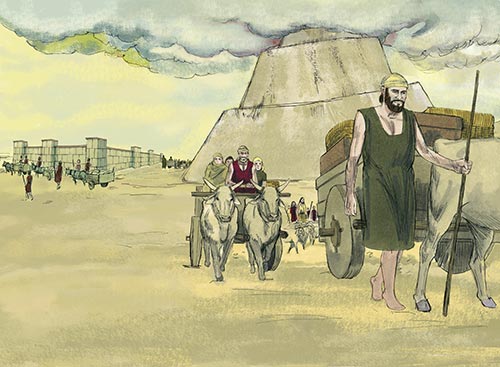The views expressed in our content reflect individual perspectives and do not represent the authoritative views of the Baha'i Faith.
History warns us that it is the customary fate of new truths to begin as heresies. – Thomas Huxley
At the moment when Abraham agreed to placate his father by leaving Harran and accepting God’s call to “go to the land I will show you,” his physical circumstances were bleak. His foes had every reason to believe that in the very near future both Abraham and his monotheistic message would disappear.
Inwardly, however, in the world of spiritual reality, the situation was quite the opposite. When a divine messenger like Abraham refuses to recant and willingly accepts the sufferings imposed on him, his actions have profound repercussions for succeeding generations:
Abraham’s migration from His native land caused the bountiful gifts of the All-Glorious to be made manifest. . . The flight of Moses, the Prophet of Sinai, revealed the Flame of the Lord’s burning Fire, and the rise of Jesus breathed the breaths of the Holy Spirit into the world. The departure of Muhammad, the Beloved of God, from the city of His birth was the cause of the exaltation of God’s Holy Word, and the banishment of the Sacred Beauty [Baha’u’llah] led to the diffusion of the light of His divine Revelation throughout all regions. – Abdu’l-Baha, Selections from the Writings of Abdu’l-Baha, p. 280.
 Still, no matter how clearly Abraham understood the eventual spiritual outcome of this second banishment, no matter how comprehensively he explained it to his wife Sarah, the thought of spending the rest of their lives in exile had to be daunting. Harran, the site of their first exile, might be a frontier town in comparison to Ur, but it held members of the tribe to which they belonged, and its culture was at least slightly familiar. Canaan, the land to which God was sending them, was completely outside of the bounds of Mesopotamia.
Still, no matter how clearly Abraham understood the eventual spiritual outcome of this second banishment, no matter how comprehensively he explained it to his wife Sarah, the thought of spending the rest of their lives in exile had to be daunting. Harran, the site of their first exile, might be a frontier town in comparison to Ur, but it held members of the tribe to which they belonged, and its culture was at least slightly familiar. Canaan, the land to which God was sending them, was completely outside of the bounds of Mesopotamia.
Their second exile meant they would be forced to find a way to establish a household in an alien environment and make a living among potentially hostile people who spoke a different language. As far as can be determined, Abraham and Sarah didn’t have very much in the way of personal possessions to take with them into exile. Perhaps they managed to trade the house and the livestock they are thought to have had while in Harran for portable wealth in the form of pieces of silver. They might even have begun the final exile in classic nomadic fashion, herding before them a flock of sheep and goats from which to take sustenance—or barter for supplies—as they moved along.
After Terah’s death—whether physical or spiritual—Abraham’s nephew, Lot, was the only family member left who was willing to undertake the perilous journey with Abraham and Sarah. The rest of the travel party is described in Genesis as “the people they had got” while in Harran. We don’t know whether these people were servants, adventurers, or converts—or a combination of all three—but the phrase “people they had got” may indicate that some members of the group were there because they had been attracted by Abraham’s teachings. This interpretation stems from the Rabbinic understanding that when a man teaches someone about God—“gets” him for God—it is as though he personally has made or begotten that person. The same understanding of being born or made exists in Christianity, as when the New Testament mentions that “Jesus made and baptized more disciples than John.” It also appears in the Baha’i Faith when those who teach others about the new religion are referred to as “spiritual parents.”
















Comments
Sign in or create an account
Continue with Googleor